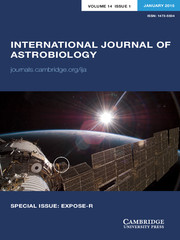One of the future challenges to produce food in a Mars environment will be the optimization of resources through the potential use of the Martian substratum for growing crops as a part of bioregenerative food systems. In vitro plantlets from 65 potato genotypes were rooted in peat-pellets substratum and transplanted in pots filled with Mars-like soil from La Joya desert in Southern Peru. The Mars-like soil was characterized by extreme salinity (an electric conductivity of 19.3 and 52.6 dS m−1 under 1 : 1 and saturation extract of the soil solution, respectively) and plants grown in it were under sub-optimum physiological status indicated by average maximum stomatal conductance <50 mmol H2O m−2 s−1 even after irrigation. 40% of the genotypes survived and yielded (0.3–5.2 g tuber plant−1) where CIP.397099.4, CIP.396311.1 and CIP.390478.9 were targeted as promising materials with 9.3, 8.9 and 5.8% of fresh tuber yield in relation to the control conditions. A combination of appropriate genotypes and soil management will be crucial to withstand extreme salinity, a problem also important in agriculture on Earth that requires more detailed follow-up studies.
Extreme salinity as a challenge to grow potatoes under Mars-like soil conditions: targeting promising genotypes.
Citation: Ramírez, D.A.; Kreuze, J.; Amoros, W.; Valdivia-Silva, J.E.; Ranck, J.; Garcia, S.; Salas, E.; Yactayo, W. 2019. Extreme salinity as a challenge to grow potatoes under Mars-like soil conditions: targeting promising genotypes. International Journal of Astrobiology. ISSN 1475-3006. 18:1. pp. 18-24
2017-12-04
CROP AND SYSTEMS SCIENCES CSS, GENETICS, GENOMICS AND CROP IMPROVEMENT SCIENCES GGCI, POTATO AGRI-FOOD SYSTEMS, POTATOES
journal_article

